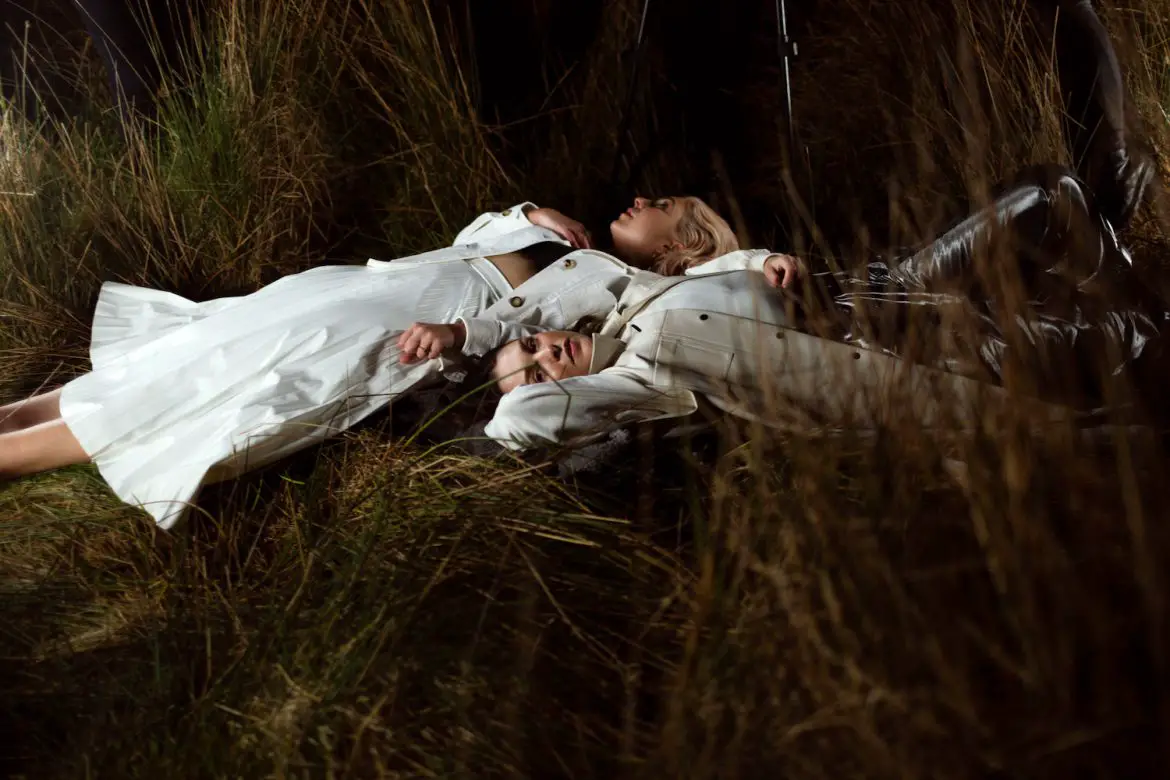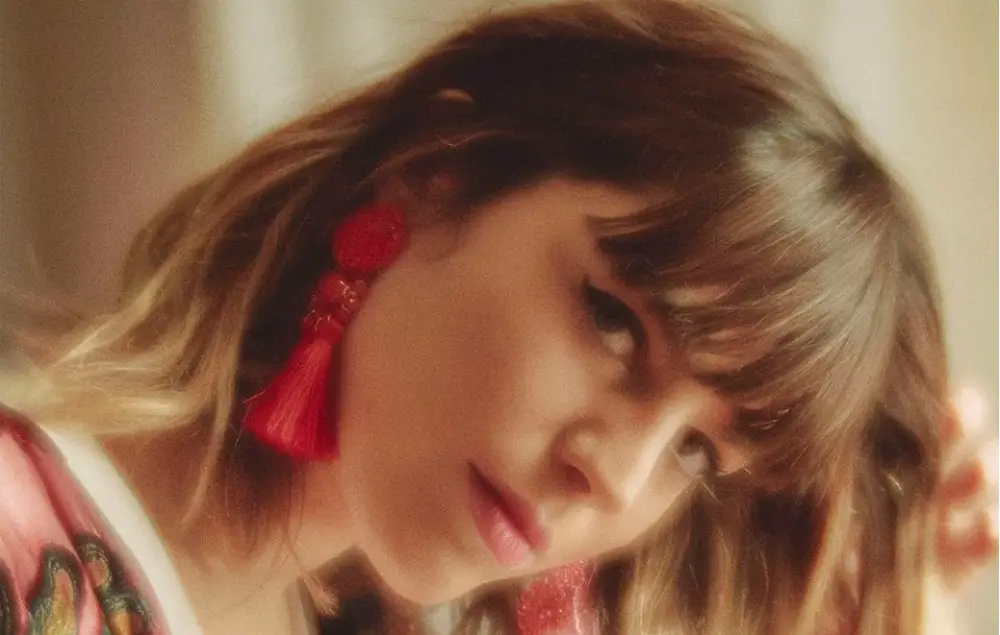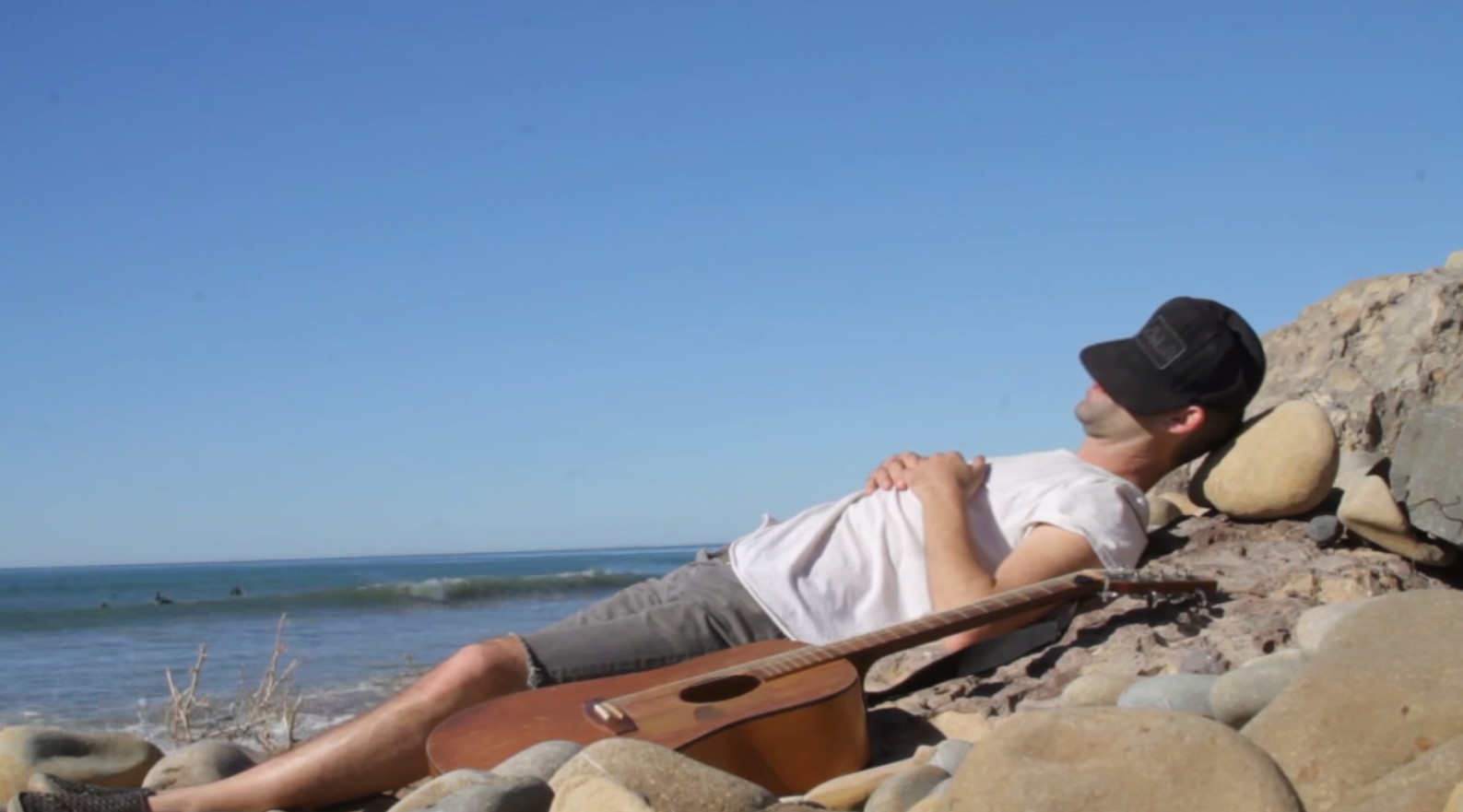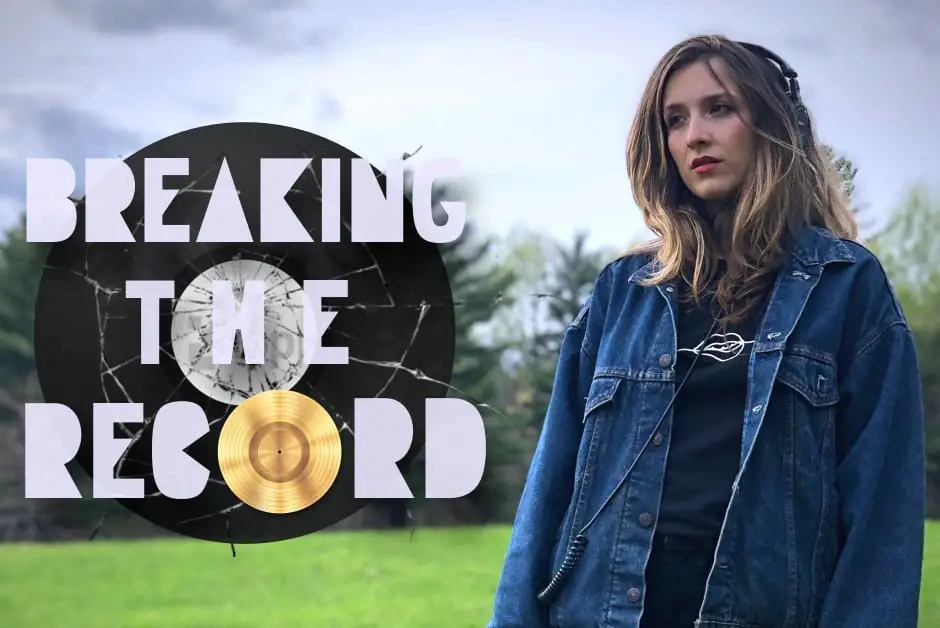Saint Sister’s Morgana MacIntyre and Gemma Doherty dive into their intimate and soothing sophomore album ‘Where I Should End,’ a beautifully triumphant record of space, reflection, and connection.
Stream: “Dynamite” – Saint Sister
You can’t put words on it sometimes, but there’s a feeling there, and I think as long as that’s there, then that’s okay.
Intimate and soothing, Saint Sister’s sophomore album is a record of space, reflection, and connection.
Vast yet subtle, soft and nuanced, Where I Should End is a radiant return from one of Ireland’s most exciting alt-folk duos – a wondrous and soaring journey full of sonic beauty, vulnerability, and heart-on-sleeve emotion. Whatever you’re going through, you’ll find a home here.
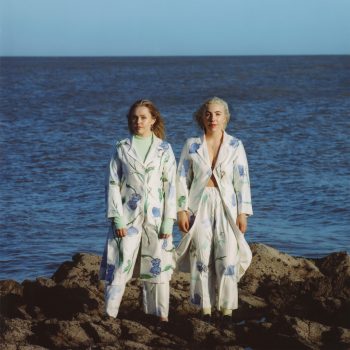
I guess it’s time we talked about
The funny way you move your
mouth when you look at me
I guess I always knew but then
A part of me was crying
when you said, “Okay, let’s talk.”
Darling what did you expect
My lover hasn’t noticed yet what’s happening
I don’t wanna watch the train
Always heavy, Ormeau rain and dynamite
– “Dynamite,” Saint Sister
Independently released June 25, 2021, Where I Should End is the long-awaited follow-up to Saint Sister’s 2018 debut LP Shape of Silence. Self-produced and written largely on the road, the record builds up from and out of the “atmosfolk” term that harpist/arranger Gemma Doherty and vocalist/songwriter Morgana MacIntyre coined for themselves in 2015. On their new album, the Irish pair embrace a swathe of organic and electronic sounds, maintaining the harmonies, harp, and keyboard work that’s long been their core while expanding the scope of their sound through synths, strings, a live band, drum machines, and more.
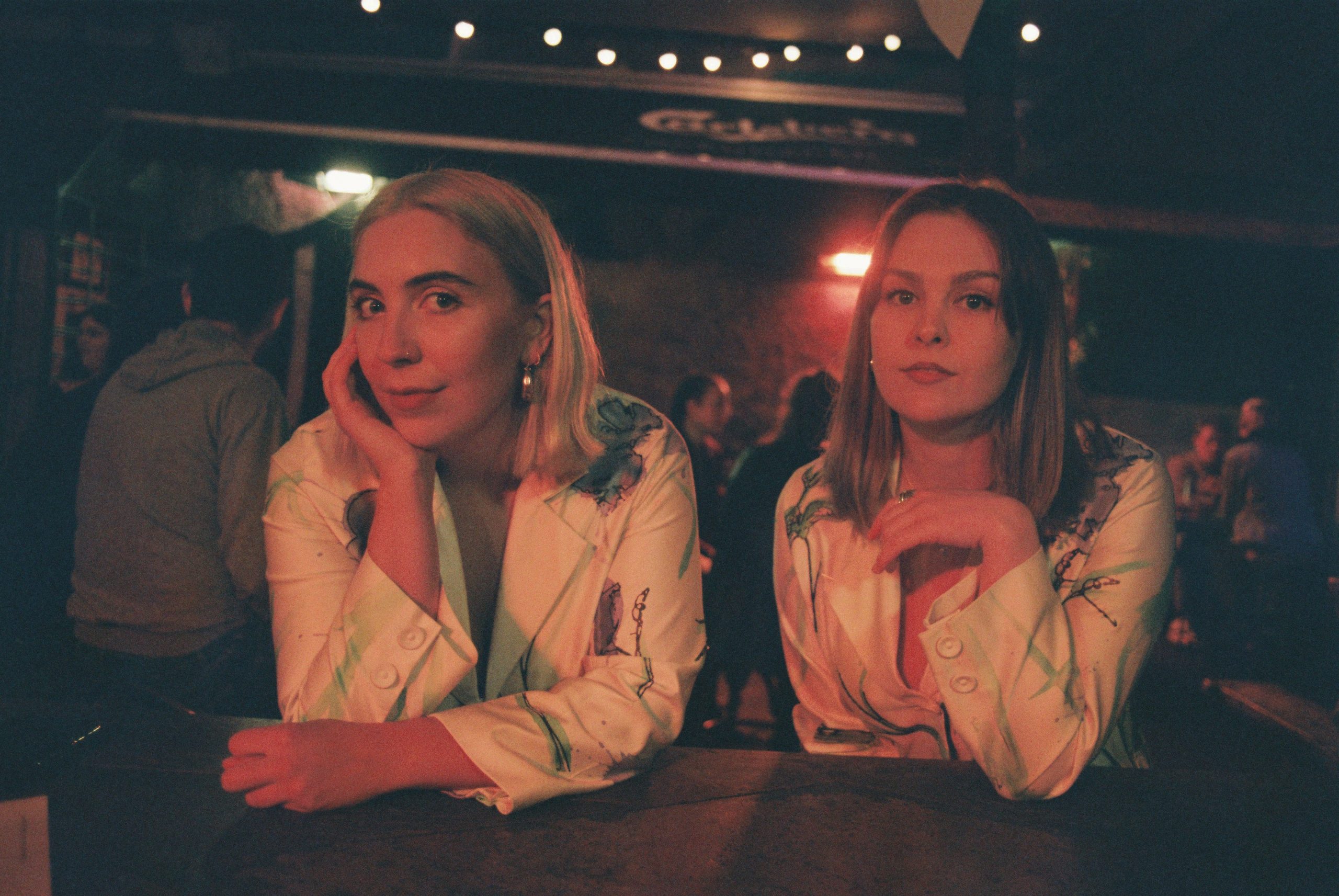
We lost a yesterday
It was quick and quiet
We were watching Christmas movies
Somewhere outside Paris
And I didn’t even hear it
A bookend of sorts
Standing over breakfast
In a holiday resort
Tried my best to lift you
We were stuck between two floors
Pacing in the stairwell
Haven’t you been here before
And I didn’t even notice
With all this time to kill
Let’s go get your things
We’ll lay them out along the windowsill
– “Irish Hour,” Saint Sister
“I’m not even sure if I was conscious of all this, but I definitely feel the directness and the honesty and the more succinct energy that our most recent record has,” Morgana MacIntyre tells Atwood Magazine. “A large part of that can be attributed to the fact that we are just better at what we’re doing and more confident… Personally, I have less things that I feel I need to prove.”
Diving into the album, she adds, “Where I Should End is all about trying to pin down something that can’t be held, trying to delineate yourself from the people around you, from what’s happening to you, from what you’re doing and I guess realizing that it’s all one big loop. I end where I begin again, and so does Gemma, as does everybody else. We’re all just trying to exist in the same world, trying to cope, trying to dream. Sometimes not coping, sometimes not dreaming, mostly just going forward.”
Oh My God Oh Canada
I know it’s weird, this thing we do
Yes, I tell you far too much
Yes, I bet you’re tired of talking too
I don’t feel like hanging up
Please don’t make this any harder
Yes, I’ve heard it every way
Yes, I know you’re not my father
Oh My God Oh Canada
On the sofa closer still
Should have thanked you for those nights
I don’t think I ever will
– “Oh My God Oh Canada,” Saint Sister
Often times, the unspoken way that music feels can be as impactful as what it’s trying to directly convey; that’s certainly the case in Where I Should End, whose intricate instrumental work sets an evocative and expressive tone – not to mention a lasting mark. Whereas the harp-and-piano instrumental song “House 9” captures the moving power and charm of the pair’s musicianship, their talents are evident throughout – from the opening moments of the heartfelt “My Brilliant Friend” and the pulsing “Dynamite,” straight through to the dynamic closer, “Any Dreams?” The hauntingly bittersweet “Manchester Air,” written around the time of Ireland’s referendum to repeal the Eighth Amendment (the country’s abortion ban), is an utterly breathtaking, sweetly stirring Irish folk song. Meanwhile, the buoyant “Karaoke Song” rises as a dazzling, harmony-laden indie pop dream literally about karaoke. Adding to the excitement on several track are the acclaimed Irish contemporary music ensemble Crash Ensemble, who add an orchestral depth through enchanting string arrangements that inject a sense of magic and grandiosity throughout the album.
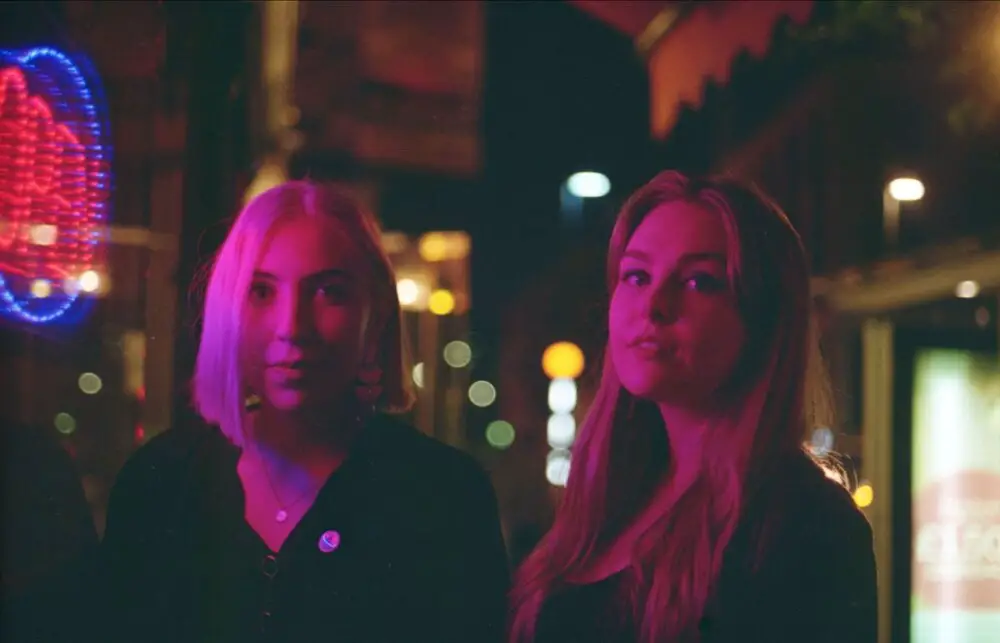
There’s no question that Saint Sister have outdone themselves on their sophomore album.
Atwood Magazine spoke with Doherty and MacIntyre about their musical growth, creative inspirations, and the drivers behind Where I Should End.
“I don’t think you should be limited to anything, so we’re just going with the flow a little bit,” Doherty says.
“It feels definitely like some sort of step,” MacIntyre adds. “I don’t know whether it’s a step up, but it’s a step forward, if you know what I mean.”
Embracing a world of possibility, Saint Sister have come away ultimately sounding more confident, ambitious, and focused than ever. Where I Should End is a truly mesmerizing, tranquilizing, and energizing experience: A soundtrack to introspection and everyday life that can offer healing and catharsis, rest and relaxation, or just ten phenomenal tunes. However one chooses to hear this album, it can surely be said that Saint Sister triumphed.
Dive into our interview with the band below, and be sure to give Where I Should End your full and undivided attention.
I’m setting the standard pretty high in terms of what I want to achieve, but I think that’s why you make music, to connect with people.
— —
:: stream/purchase Where I Should End here ::
Stream: ‘Where I Should End’ – Saint Sister
A CONVERSATION WITH SAINT SISTER

Atwood Magazine: Hi Morgana and Gemma, it's great to connect with you both! I know that you've been around as a band for about seven years now, and you're received considerable acclaim in that very short period of time, being named “Best Irish Act” by local papers and gathering quite the following. Tell me, if you could please, a little bit about your first couple of years and what that experience was like for you?
Morgana MacIntyre: So we met the summer that we finished college, and I think it was just very fortuitous timing that we met each other when we did because… And one of the reasons why I think we worked and we’re still together is that we both wanted the exact same thing at the same time when we found each other at that point in life, where it was just before we had got too invested in whatever we… Other plans were available to us, so I was working in a bookshop and Gemma was teaching keyboards to little kids. And I think, yeah, we were just both desperate to make music and we signed together in the college orchestra and then I asked Gemma for coffee. And it was just really clear that we had one goal in mind and that maybe teaming up would help us get there. It’s been a couple of years, seven, god, that’s the first time we framed it [that way].
I guess a summation of how the last couple of years have gone is that we were very lucky to be able to tour quite early on and so for the first couple of years, we put all our energy into touring and that was amazing. And I think we really cut our teeth doing that and it really informed the way we wrote, but it didn’t mean that we were quite slow to write ’cause we just never set aside time and the one time did decide to set aside time, we got offered a tour with Lisa Hannigan and we just couldn’t say no to that. So yeah, it took us a little while to get around to the first album and then when we did, we put it out as ‘Shape of Silence’. Then I think we were keen to get the next album out quicker than the first, and that we were just in the mood that it was working quickly and we were enjoying that. And we had it all ready to go just before… I think we were finished… Just finished the mixing stages and the pandemic broke out, so fast-forward a year of trying to figure, find our feet in all of the changing environments and the changing industry, and that’s where we are now and just about to release the second album.
You mentioned your debut Shape of Silence, which I would love to talk about for a second. How do you feel that record really introduced who Saint Sister is musically?
Gemma Doherty: How do we feel it like as an introduction, like what does it say? Yeah, I guess it is… We see this, the record we’re just about release, obviously, a bit differently. It was conceived of in a different way and hopefully, it’s a bit of a progression. And we recorded it in a different way, we made it, we wrote it in a different way, but the first album really, as Morgana said, was kind of a product of us beginning to… We started off really playing live and that was the beginnings. And we were finding our feet in the studio over a number of years and yeah, I guess ‘Shape of Silence’ is the… That’s what came out of that. It started off as… There’s one track on that album that was on an early EP of ours, Madrid, which I feel like that’s probably the first track that we really find our flow in the studio and started to bridge that gap between what we wanna do live and what elements of that we wanna keep and what’s really important.
The core in the live show is our two voices and the harp, and they’re really important elements to us in the studio as well. I guess as a duo, we’re a bit more open in terms of what the roads we can go down – it’s kind of a blank canvas in the studio environment… I think our live setup, when we started gigging, we were always really aware of not letting that inform the studio too much. So that you go studio first, make whatever you want and then figure it out live afterwards. [chuckle] Which can be a bit of a challenge at times for the live show, but that’s always been how we’ve approached an album. And yeah, I think with ‘Shape of Silence’, it’s pretty… Yeah, I don’t know.
Morgana MacIntyre: I guess it’s quite atmospheric in a way, that maybe the second record isn’t as much – although I think there are moments of that on the record, but I think there was a world that we were building, and it was heavy in atmosphere and fog. It feels heavy to me, and not necessarily in a bad way, but it feels weighted – whereas the record we’re about to release feels a little bit more centered and direct and less obscuring, if that makes sense? Less kind of blanketing.
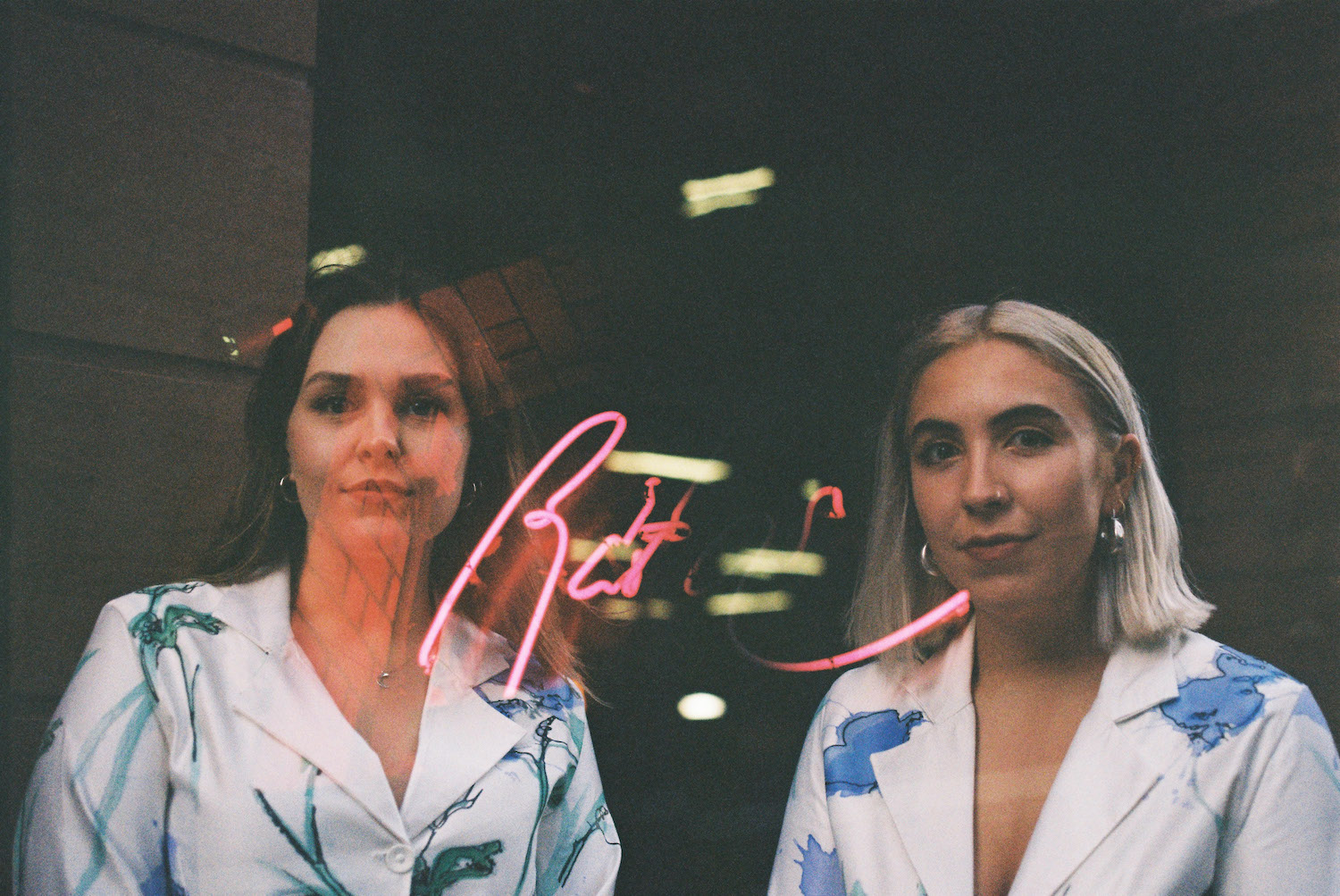
Do you think that speaks to what you two were going through at the time when you were making Shape of Silence versus over the past three years?
Gemma Doherty: Yeah. Also, our relationship with each other has grown so much over the years in the way that like you’ve talked about this album, a lot of the songs were written while we were going through things together and the other experiences from touring and from, yeah, dealing with that kind of life together. And then maybe us trying to tackle that in a bit more of a light-hearted way, whereas in the first album I guess we were trying to be something kind of different.
Morgana MacIntyre: Yeah, I think it’s all about confidence, and I think the more confident that we became, the easier it felt not to have to… I guess we weren’t trying to prove ourselves as much on the second record. I think a lot of people talk about the pressures of a second record, but I think we had that on the first record more than the second. I think the first one took us so long that I probably had a lot of narratives in my head about what was expected of us, and what I expected of us, and the kind of music that was cool and that was smart… I did have a few hangups and then I think just as you grow older and get better at what you do, you realize you don’t have to, and I think I relied more on maybe imagery rather than saying exactly what I meant, and I would like to think that I was trying to get there on the first record. I’m not even sure if I was conscious of all this, but I definitely feel the directness and the honesty and the more succinct energy that our most recent record has, and a large part of that can be attributed to the fact that we are just better at what we’re doing and more confident… Personally, I have less things that I feel I need to prove.
I’m not even sure if I was conscious of all this, but I definitely feel the directness and the honesty and the more succinct energy that our most recent record has.
Once you get the hang of it the first time, it's like riding a bike. You just get better and better at it, and I’d love to dive into that. Where does Shape of Silence and Where I Should End begin for you?
Gemma Doherty: I guess the way in which they were written and recorded and the single that we released very first off this new record, “Dynamite,” feels like a nice bridge between those gaps in my head. I think instrumentation wise and that kind of the colors of it, it feels to me like one that could be an extension of the first record. And it came out first and we recorded it first. And yeah, just the layers in the instrumentation and the sort of, yeah, the tone of it, I feel that’s our way into this one.
What was it about that song? Why did you want to introduce the record with that song?
Gemma Doherty: It was one of the earliest ones that we had written, or that we had finished at least. We started recording that one a little bit earlier than the others. I think it just felt like a nice kind of segue between the two. It felt like a nice introduction to this album and this world.
Morgana MacIntyre: I think because of the way the year has gone for everybody, we’ve kind of had a few different entries into the album. So I don’t even, necessarily even think of “Dynamite” as first single because in my head I guess we had “The Place That I Work” at Christmas, which was not necessarily… I don’t even think of that as a first single, I think ’cause it felt like something that we wouldn’t have necessarily released in that way, except for it really felt right at the time! I guess we were all really frustrated with everything that was going on and sad and depressed and figuring out how to cope with everything, and it felt right to do that at that time. But then again in March, then we had “Karaoke Song” which mostly ’cause of the different… The gaps of time in between the releases, that feels like we’re starting again, but it felt right to make sure that “Dynamite” was out there and that “The Place That I Work” ’cause they would be I guess more relatable to our first record. So if anyone had listened to that, that it would make more sense in that “Karaoke Song” is a little bit of a divergent.
Do you both share songwriting and musical responsibilities?
Gemma Doherty: It’s pretty split on the middle, yeah. Morgana is our songwriter and I’m on musical responsibilities, [laughter] as you put it! That’s always been the setup, but I think during the first record, we were gradually fitting into those roles a bit more and becoming a bit more comfortable with them. And yeah, realizing that we might be in different flows with different songs at different times and that, that’s okay. We’re not necessarily in the same room, we’re rarely in the same room working on something together, so yeah, a lot of the times it varies between song, but a lot of… Between songs, but a lot of the times, Morgana will send me voice notes or recording of lyrics and a lot of the time melody. And then I’ll sit with them for a while and start to build a bit of a word or a bit of a feel or structure or whatever it is that it needs, they always, yeah… That process, that process changes, sometimes it goes the other way around, but yeah, it is… We do pretty much split those… Split those roles down the middle.
That's wonderful. You mentioned how this album felt like you were getting into the groove of things. Can you share a little bit about the story behind these songs, how they connect, and what you're trying to convey?
Morgana MacIntyre: It’s always hard to know what we’re trying to convey and that’s something that always comes at the end of the process when you’ve made the record and everyone’s… Our PR team were like, “So what is the story? What’s the buzz?” But really simply, we wrote these songs in a very short time period and they were all on the road and to do with experiences that myself and Gemma were going through at the exact same time. I hope and I think that that will impact on stage a bit later when we do eventually get to play on stage, because the first record, some of the lyrics were written before myself and Gemma even joined forces, so I’m delighted that this record will be much more representative of our joint experience, and I’m curious to see what that will feel like on stage when we’re both singing about things that happened to us and we can kind of give each other the knowing eye.
Each song circles around very specific relationships, and the title hints at that idea. It comes from the opening line, which is, “My brilliant friend traces where I should end and where I should begin,” and that idea of, how do you define yourself in relation to another person when you’re always with that person and your experiences become one, and you lose the sense of your own self and boundary? And whether that can be an incredibly rewarding thing or whether that can be harmful. I guess that even start showing across the record and it starts with “My Brilliant Friend,” but say, in “Oh My God Oh Canada,” that song’s all about not feeling like you’re a good enough friend and always feeling like you could do better and that you’re never gonna match up, and just about that co-dependency and when it can go wrong.
Each song circles around very specific relationships, and the title hints at that idea. It comes from the opening line, which is, “My brilliant friend traces where I should end and where I should begin,” and that idea of, how do you define yourself in relation to another person when you’re always with that person and your experiences become one, and you lose the sense of your own self and boundary?
Thank you for sharing that. You mentioned earlier that you feel this record is lighter and is less dense than your debut. Did you have a specific vision going into it in terms of the kind of music you wanted to make, following up your first record?
Gemma Doherty: I think musically, it followed on from taking inspiration really or just reacting to the lyrics, and whether there is that thing that, as we said, there was a bit of a directness there, but I think also we did some… I think we did have a pretty strong vision of how we wanted this album to feel, and we tried out a few different producers over the months leading up to the recording. I think that solidified how much we actually didn’t know what we wanted – nothing really clicked, and we decided we just wanted to produce it ourselves.
And there was a lot of nice freedom in that – it was lovely to be able to do that! I think we wanted to just experiment a little bit more and estimate a bit wider with instrumentation and with different players that we brought in and our arrangements. Unlike the first record, which was kind of sporadic over a couple of years, this was a bit, a lot of more defined studio time. So we were stricter with ourselves and we… Yeah, we knew what we wanted it to feel like. You can’t put words on it sometimes, but there’s a feeling there, and I think as long as that’s there, then that’s okay.
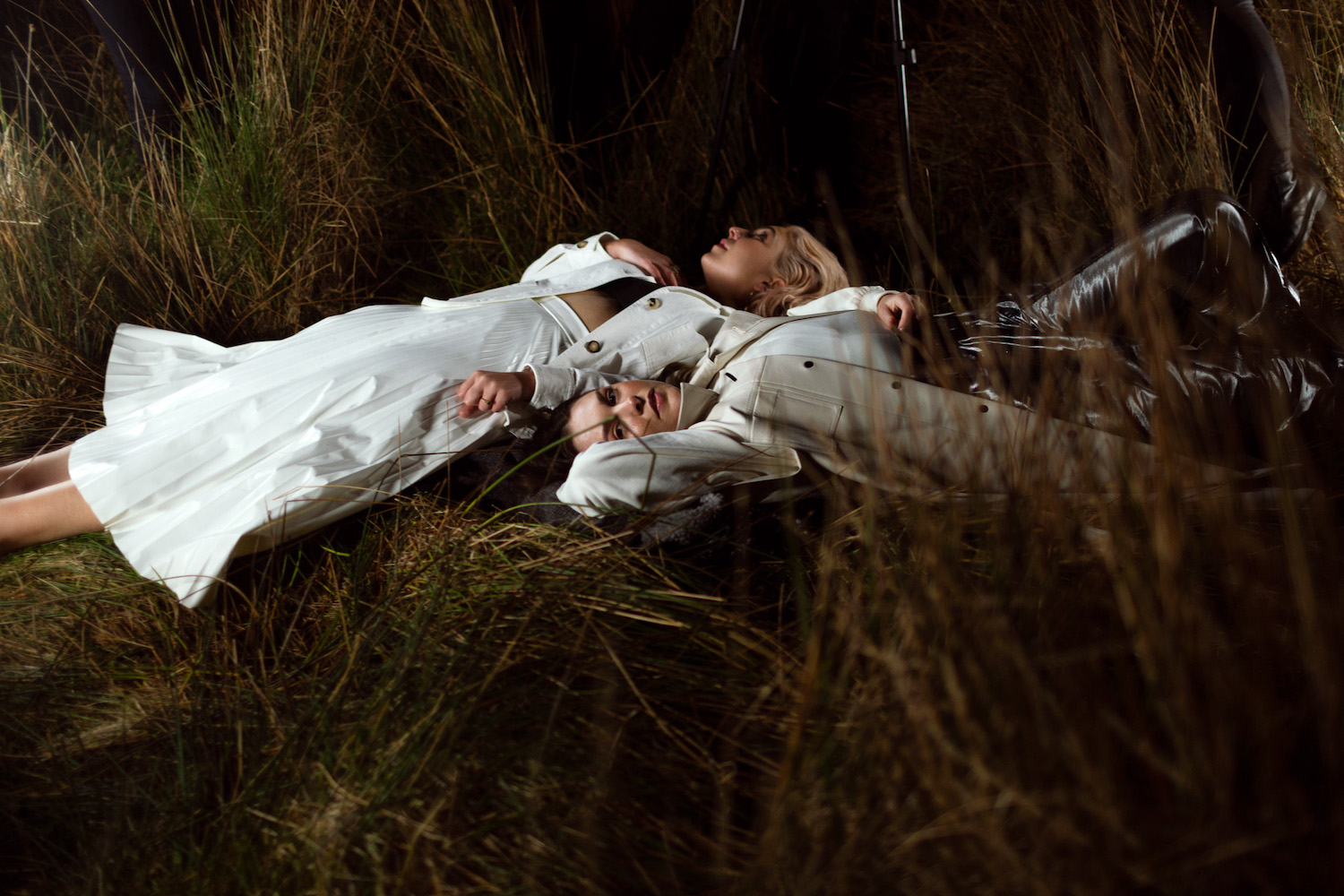
One of the most exciting things I think a band can do is bring production in-house. I think it completely changes the dynamic for your art when you have complete control over it, and you're not reliant upon an external producer. Can you tell me about the experience of producing this record, and what it felt like to be in complete control?
Gemma Doherty: The first one was great as well. We took so much from that process, we produced it with Alex Ryan, a friend of ours who was based in Kerry, and the studio was based in Kerry. And the three of us went in together, the three of us decided to record together and we started that whole recording journey with him, we did the first EP and everything together. And it was very much just… It was a really fluid process, it was kind of a… It was a co-production thing where we all just… It was very much the three of us, and that was brilliant. And I think we learned a lot from that and we had so much freedom that felt like we were producing that one as well. We just had that extra bit of something, so I think we really wanted to try something different this time and I guess,’cause that did work so well, I think then we did find it jarring when we tried other things.
Because it was like oh, this is new, and it was a bit of an adjustment too. I think it was only at that point we realized actually we really do know how we want this to feel, so I’m really glad that we went there. And I think there’s a bit of, if you haven’t… Until you’ve done something once, it’s hard to call yourself that thing, so there was a lot of talks between us about maybe not knowing if we… Just thinking that it maybe needed something else or we needed that extra step, and then it’s only really when you do it that you’re like, yeah, I know that’s grand. [chuckle] We didn’t… So it’s just, yeah, I think it’s confidence as well, and it took a while for us to settle into that, but… Yeah, I’m glad we did.
Morgana MacIntyre: I think that the fact that we both do separate roles helped us in that regard, in that I guess when you’re… ‘Cause I’m slightly watching you do the production, I knew that you could do it. But I think when you’re the person doing it, it takes a little while to really put that on yourself and to take that responsibility, so it was nice being able to… If you were ever panicked and wondering whether you could do it, being able to be like, “No, you definitely can, and I trust you, and I want you to do this,” and it’s so cool that we’re out the other side of it now, because you’ve done it once and you could be able to do it 100 more times. [chuckle]
That's incredible. Were you always into production? Was that something that you learned along the way in making this record?
Gemma Doherty: Yeah, that would be more my background, I guess, from composition and arrangement and coming from that side of things, it’s all very closely linked. Over the last couple of years, I’ve been trying to become better with the more technical engineering side of things, which I think is obviously a huge part of that as well. So that was more the part that would have set me back or that I wouldn’t have had there, that I wouldn’t have felt I had the confidence in. But yeah, it’s mostly arrangement, that would be my world.
We talked a little bit about “My Brilliant Friend” a few minutes ago. I love how this song opens the record. It is so soft and subtle, but it grows into this magnificent, beautiful, very expansive piece that really sets the tone for the album as a whole. Can you tell me a little bit about this song and why you chose to open the album with it?
Morgana MacIntyre: I remember singing you a very lilty version of this. I had the words and song sort of idea of a melody, but it was very sing-songy, and I see it now as quite a sober song and steady in its delivery, but it was kinda like da da da da, da da da da da da. And you took that away, and I remember you sending… ‘Cause I think I was on holiday at the time and I was… God, it’s so funny thinking about it now ’cause I haven’t been on holiday for so long, [laughter] but I remember being on a sun lounger and then putting my headphones in and listening to your demo of it and just being like, “Whoa, I didn’t know the song was gonna go there.” But I think I’m so glad it did go there. I love that it starts, as you say, very intimately. I think it make sense to start the record there in a very close sense, especially coming from the record that we just released, having it open with a very centered sound and then the two very close vocals seem to work. And then, I guess, yeah, those vocals are interrupted with moments of instrumental. And I think it made sense to start with that song because it sets out our stall that we’re doing the thing that we did before, which is the close vocals and the close harmonies but that there’s a bit of a change in tone, and then we’ve got live drums, for example, which we had so… I don’t know if we had it. We probably had a little bit of live drums, but not…
Gemma Doherty: We didn’t have the live band, not as much on the first record. And it is very much like an interruption, where you’re mid-sentence and then the band just takes… They rudely interrupt the vocals.
Morgana MacIntyre: Which I think is a nice nod to our dynamic, even. [laughter] The idea of like, “Okay, we’re gonna start with the lyrics,” and then boom, Gemma comes in with the instrumental. And even just the title of, Where I Should End and where are we going with this song? [laughter] Hopefully, the listener finds out!
I think it's so brilliant that it subverts expectation. It really speaks to what's going on in this record, that we have this evolution in the first four minutes.
Gemma Doherty: Yeah, that’s where we like to put it as well. It feels introductory in a way, but then it just takes you somewhere else, and even the fact, the way that the song ends, it’s a real jam and everyone can play it though. And it’s a funny one to put first because it almost feels like that could be at the end or something, but yeah, we just liked it, we thought it was a bit weird and cool.
I had written about “Karaoke Song” not too long ago for our editor's picks, and I thought it was absolutely captivating. The way that you created this world with your voices is truly beautiful. Can you tell me about that song? I think Morgana, you were saying earlier you felt that one was also the lead single. What about that song is really special for you?
Morgana MacIntyre: I think what’s special about that song is that it was the first one that we wrote and then, while we were recording it as well, this kind of fed through, but we wrote that and felt like it was good fun. And I guess we haven’t really written… I mean, there’s definitely songs that we’ve written that are a little bit easier to dance to than others, but I think I use dance in a very loose term there…
Gemma Doherty: Sway.
Morgana MacIntyre: … Sway softly, I guess. This is where it was born. I think this is why it’s come through to every part of the process of it, including the video, it was born out of a really fun night, and then the first words were written as a bid to make Gemma laugh because we were in a writing session at the time and it was one… At the end of a day, I think it was one of those ones that you’re struggling with a song, and when you’re trying to be creative in this, and as you try, it doesn’t really work. And I think I remember Gemma, you were working on some song or something in the corner. And I kept just being like, “Gemma, what do you think about this?” And I was using the lyrics as a way to make it up, but also wind her up a bit. [chuckle] And then every time we did them, I would just kinda laugh and be like, “No, don’t, don’t worry, don’t worry. I’m actually working on some proper lyrics while we’re doing it.” And they just kinda fed from there, and I think, yeah, it was a bit of a departure lyrically in that we hadn’t really written…
I probably would have associated those kind of lyrics as maybe too frivolous or kind of… I don’t think I really, until recently, saw the merit in fun music. [laughter] And I know that’s stupid because I do enjoy dancing to fun music, but I guess I just never… It was never natural for me to write that kind of way and then, lo and behold, I did and it’s really good fun. It’s way funner than the sad music, although that has its place, but I think that’s why it’s so special to us and then going on to the video where we were really pushing our comfort zones and pushing ourselves out of our comfort zones. And I think people are used to seeing artists dancing and doing all that kind of stuff on screen, so it might not feel like that big a thing to anybody else, but I don’t think I would have believed you if someone had said we would be doing choreographed dancing in our video in maybe a year from that, year or near. So I’m so glad, I think that song helped us on that journey and probably will inform how we perform on stage. And I’m sort of looking forward to bringing some of those elements into the live show.
You have defined in the past as a folk duo, right? There's a certain image that we conjure up in our heads when you talk about the word “folk.” It's hard to break out of that dynamic. Is that starting to break down for you, especially with this album?
Gemma Doherty: We’ve been talking about that, and it’s definitely not something that bothers us and that we’re really actively trying to get away from or anything like that. You don’t set out to make anything really specific or particular, we just started writing music and started singing songs. And the things that come out, then they start to define what your genre is or what you are as a band and how you portray yourself. And it becomes this cycle of you do something and then people react to it. And it’s all feeding each other but… There’s nothing wrong with that.
I think we sing in this specific way, we sing in our own accents, we play an Irish harp that’s a folk instrument. There’s a huge connections with folk music and a huge draw to that, and that’s a huge part, I think, of what we do and how we write, but at the same time, I don’t think that that could be the only thing that you do. I think it’s just [about] where to draw that line and where to set a limit for yourself… I don’t think you should be limited to anything, so we’re just going with the flow a little bit.
Can we talk about “Irish Hour”? That was a really interesting standout for me.
Morgana MacIntyre: Yeah, “Irish Hour,” the title comes from a game that we used to play on tour, it started off… Karen Labrie, our friend who was on tour with us taught us a song, Good Song, Better… Sorry, taught us a game, Good Song, Better Song, where you just try and play the best song in the world after the other person on the playlist in the van, and then we decided to up the ante and make it an all Irish game. So it was a Good Song, Better Song, but you had to agree… We made it where you had to pick an artist from a county, and we were doing the county alphabetically, so it became quite intense but the reason it’s called that is because that song was written about experiences, yeah, that we had on the road, and probably the lowest point of our touring experience.
Gemma Doherty: I was written about what Morgana wrote the lyrics and sent them to me about, yeah… Just we’d been on the road for about three months, and I’d had a bit of a personal thing going on in my life, and I guess it was written from Morgan’s perspective about something that I was going through and how we were helping each other through that and dealing with things on the road when you’re away from home and you’re living in each other’s pockets. And yeah, the vocals in that song are pretty… How do we describe them?
Morgana MacIntyre: They’re compacted and close…
Gemma Doherty: Pretty compacted… When we first laid them down, it almost felt like just little rain drops. They’re very… They just drop, and they’re quite enclosed and in on themselves, but then I just… There was a lot of space in that song to kind of take it elsewhere. And once we had decided to bring strings onto the record, that’s one place that I heard that there was room to kinda go somewhere, somewhere new with it. So yeah, I had a lot of fun with that string arrangement. And I think that the… Yeah, just the nature of what the song’s about and the way in which the vocals move quite… They move quite gently through each other, and then they sort of stop, and it’s almost like the instrumental kind of… And in similar ways to “My Brilliant Friend,” where they don’t overlap at all, but they kinda complement each other, and it’s almost like all the things that you don’t say in the lyrics.
I think, potentially, that song, because it was written about something that was very personal to me, I kind of went off and on at the end and then there was this space to just kind of… Yeah, it’s like, for me, it feels like you’re expressing all the things that aren’t said in the vocals, which are a bit more… Yeah, they tread softly, and then the instruments do the talking, and then it comes back to just this very two tight vocals at the very end.
I was also taken by “Oh My God Oh Canada,” which, even as a name, is striking. And then you listen to this very, very soothing, very powerful song.
Morgana MacIntyre: Oh, thank you. [chuckle] Yeah, that one was… Yeah, I think we were mentioning earlier in that it’s like about never feeling like you’re measuring up and that feeling disconnected to somebody and not knowing whether it’s your fault or their fault or the world’s fault. And it’s called “Oh My God Oh Canada” because we were in Canada when we were writing it. And I had recently read an interview with Big Thief where Adrianne talked about how she used specific names that weren’t necessarily of people that existed, like Paul or whatever in her songs that… And she would use them to direct sentiments that maybe were supposed to be for herself or for other people, but just kind of picked a focal point. And in the song’s case, it was a name, and I just loved that idea. And the song started becoming about so many people and all the ways that you can let them down and then all the ways I’ve let people down in the past, and it felt right to have some sort of all encompassing name or put a label on it or something that I could direct everything towards.
And at the time when we were in Canada, it was covered in snow, and it felt like this big, vast open space that you could shout all your worries into and try and get them off your chest. So that’s why it starts with that and as a, basically, as a receptacle for all the paranoid thoughts that you can have or that anyone can have.
I love that. You most recently released “Manchester Air,” and what I really love about that song is the amount of space that put into it. It really feels like you allowed the seconds just to kind of melt and your voices to really just kind of grow into everything. Can you talk to me about the process of feeling comfortable with space and how that factors into this album?
Gemma Doherty: Yeah, it’s really interesting. And I think that was, ’cause of the subject matter of the song as well. And it’s so, it’s so narratively driven and it’s so led by the vocal, and there is such a narrative there that I think, arrangement-wise, I’m always, I’m very aware of never wanting to get in the way of really trying to… You try to dance around the lyrics where appropriate, I guess, and where it’s all about they have to complement each other. And that was definitely one that felt like it does need that space and there’s like moments for reflection in there. So again, there’s anything, anything, all the instrumental weight is kind of comes at the end of the song. And we… I think we recorded that. It’s pretty free in tempo, and it’s just these drums and just kind of creating a bed for the vocals to sit on top of, and…
Yeah, just allowing them the space. I think that it is a really interesting word, I think, in music, and it’s one that I do refer to a lot. Maybe did a bit more on the first album. And like what does it mean and what does it do? And how do you create it? But yeah, definitely something we’re very aware of in this song.
It sounds like there's as much lyrical ideas as there are sonic ideas on this record, where you let the sound speak for itself?
Morgana MacIntyre: I think that maybe comes from the fact that… Yeah, ’cause we do have a split job. We’re not like… I think we have two people here who are working on different things. So it’s maybe easier to make sure that all angles are covered, ’cause I love kind of atmospheric music and really kind of music that leans into that kind of stuff, but I also love songs that have a structure. And it’s nice to be able to bring both of our angles into it, so that I don’t get too carried away with making something like a very specific song that can be sang and it doesn’t have anything else going on and it’s too obsessed with the vocals, and then, yeah, Gemma can just do her thing, and I won’t have to worry about the tune. [chuckle]
So it's you two, and She keeps you from just writing your song, and you keep her from just making it her song?
Morgana MacIntyre: Yeah, I think so.
Gemma Doherty: Yeah. I think that we have allotted space for both… For all those avenues on this record. They aren’t all songs with a verse and a chorus and they go that way. Some of them… If a song is a verse of more of a free-flowing narrative thing, that’s fine. Not feeling like you need to force things where they’re not needed or force a chorus where it’s just not that type of, type of piece.
I appreciate that, it's really hard to kind of let go. The last song that I really, really want to talk about is the album finale, because I think if I had to choose a new favorite… I just love “Any Dreams?” It’s so… dynamic. And I guess the truth of the matter is, I didn't expect it.
Gemma Doherty: Yeah, when we started… So I’ve such a specific memory of starting to write that song because I know I said we don’t always write in the same room at the same time, but again, we were in a writing session and coming to the end of another day. And we were getting a bit frustrated at something else and I had been saying, “Let’s try and write something, let’s try and start… We need something new,” and Morgana was of the opinion that nothing new was gonna come that day, nothing at all, don’t even try, don’t even start. So I was just like okay, grand, I’m just gonna sit over here and play the synth and we’ll just do our own things. So I started playing the synth, the loop that’s on there, I just started messing around with that. I was messing around with sounds and things and as I was doing it, Morgana just started mumbling in the background. And then the next thing there was a mic and then the next thing there was like this next minute monologue that flowed out of her and I was just there playing, saying nothing, knowing that if I… Just don’t… Just see what happens, and so that ended up… And there was something really… It’s also… That’s the first point on the record, or in anything that we released, that it’s just Morgan’s vocal of its own, and that’s where it came from, where it was almost you were almost like half-spoken, just really just airing things and talking. And I just…
Gemma Doherty: There was something really special in that and we started to throwing things, going and recording things. And I just remember thinking we shouldn’t mess with that, we’re not about to go and try and find the other voice or two voices, that’s its own thing and it has something really unique. And yeah, it just went from there. It’s a monotone in terms of structure and it really does feel it’s just a journey. It just goes off on one and then decides to go somewhere else and it’s a bit of a ramble, but that’s how we wanted it. It’s also the first one that I heard strings in my head for the arrangement and that’s how they ended up on the album in the first place on that song. We felt they needed it and then at that point we were like oh, maybe we could have them in other places as well. But yeah, that’s that song for you, many things.
Morgana MacIntyre: Many things… I think it’s just about not being able to cope and being… Trying as hard as you can and then snapping. And I think and I hope that there’s a little bit of levity towards the end of the song and that it has its climax and its breaking point in the last 30 seconds with a bit of a screaming of I can’t keep up and then the last line coming back to something a little bit more calm. And that’s when the title of the song is mentioned of “any dreams, keep them fixed.” And it’s funny ’cause we both thought about that line as something different kind of different, I think, but in my head it was the idea that your life might be this conveyor belt and you’re just getting by and you’re just existing, but that if you have any dreams, keep them fixed in your horizon and even if you’re not actively pursuing them at all moments, if they’re just there in your mind’s eye, then that is enough to guide you forward. But yeah, that’s what I was trying to say I guess.
I appreciate that. I think it's a really great send-off for the record as well. It's really energizing, but at the same time there's a closure to it. So, I've shared a bunch of the songs that I really loved off of this record; do you two have any favorites that really resonate with you?
Gemma Doherty: I think, yeah, it changes from time to time, but I think it’s possibly between “Any Dreams?” and “Irish Hour,” I think.
Morgana MacIntyre: Yeah, I think I might do the same. It does change. I love “My Brilliant Friend” as well. I think whatever song hasn’t been released…
Gemma Doherty: That’s what I was gonna say, yeah.
Morgana MacIntyre: I feel they are the best ’cause I went through a period of thinking it was “Karaoke Song,” but now ’cause we played it too much or we’ve heard it and we’ve done too much of it already even though it was just been out there, but just…
Gemma Doherty: Your perception and your relationship with them changes so much over the course of the whole process. I think it’s no coincidence that we both chose songs that haven’t been released yet, so ask us in a few weeks and it might be different again, but…
Do either of you have any favorite lyrics that really resonate with you?
Morgana MacIntyre: I think my favorite lyric is from “Any Dreams?” which is, “One of us waits, the other’s stuck and I can’t tell the difference.” And it was… I think it was one of those ones where when I didn’t… Every once in a while, a lyric will happen like that, where I don’t… I’m not… I don’t know where I’m going when I start the sentence, but I just write the thing in one whole sentence and then I was like oh wow, that’s actually exactly what I have been thinking, but I wasn’t intending to write that in that moment. So it just obviously would sit in my brain for a little word, but… Yeah, I think there’s… It denotes that idea of not being able to communicate where you’re at. It’s one of the saddest things that if you’re in the situation with somebody and you’re both on completely different pages and not able to communicate with each other and not able to figure out where you are or what you’re doing…
I think that's really special.
Gemma Doherty: It’s funny, ’cause we haven’t been able to sing these songs loads live… They take on a whole new life then we do that, you do that night in, night out. I think one of my favorites actually is from “Dynamite,” the line, “All I do is take and take and make shapes with them.” I love the phrasing of it in the feel of it and I love the way that it flows out when you sing it, but I also think… Yeah, I think it’s beautiful.
Morgana MacIntyre: Thanks.
We're now just about two weeks away from your sophomore album release. You've been sitting on these songs for a whole year, and it took another two years to bring them to life. How does it feel to finally be on the cusp of bringing this out to the world?
Morgana MacIntyre: It’s nice. [chuckle] Very looking forward to bringing it all up [laughter] ’cause we’ve already shared some songs from it, it’s nice to… It’s kinda like you’re completing the puzzle. And we’ve spent a lot of the year on the artwork with some great visual artists here in Ireland and really happy with how it looks. And it all just feels really beautiful and really excited to just get the full thing out ’cause it does really feel like one piece of work in my head. And it’s nice to be able to, yeah, you’re just… It’s like a completion of something that we’ve, yeah, had for a really long time, but still really, it doesn’t feel for as long as the wait was and all the rest, it still feels really nice and exciting. It’s not like oh God, just get it out there. It’s a really like we’re really happy with it and really proud of it, and it would just be a really lovely feeling to have it out.
What do you think you personally took away from creating this album? How does this album change who Saint Sister was?
Morgana MacIntyre: I think… Well, going forward, it’s probably really impacted what we’ll do on stage and us being more confident in our live roles and I think having a bit more fun on stage. And personally, I don’t wanna make any promises I can’t keep, but I feel, and maybe this is just because I haven’t tried it yet, I’ll be trying to dance a little bit more and just be a little bit more comfortable in my own skin. And I think… Yeah, I think that’s gonna be fun and exciting to be playing songs with a smile on our face because the songs are happy songs, which is gonna be a new experience for us. But yeah, just in general, the making of this is just… It’s been a journey and from the start of, I guess, the writing and the production of it, that was a massive step up for us, in terms of the responsibility that we were taking and then the decision to be a bit more present in our music video was a bit more present in general online and share a little bit more of ourselves, I think has been a bit of a journey as well. And I think that was a hard journey, but it’s hopefully… I already feel, especially the appearing in the videos, it’s been so rewarding and something that I think I’d like to keep going with and see where we could push our boundaries.
I'm so glad to hear that. It sounds like this is a really impactful album for the two of you and for your band.
Morgana MacIntyre: Yeah, I think so. It feels definitely like some sort of step. I don’t know whether it’s a step up, but it’s a step forward, if you know what I mean?
I think so. Lastly, what do you hope listeners take away from listening to this album?
Morgana MacIntyre: I think it’s hard to answer that in relation to the whole album, because there are a few different messages I think within it, but there are moments that I think are to me, particularly important or special in terms of how I imagine someone feeling when they listen to it. And I guess “Manchester Air” is one of those and maybe “Any Dreams?” Is another where I guess sometimes we’re dealing with fun things like karaoke or sometimes we’re dealing with heavier topics. Sometimes when you listen to music and songs that reflect your experiences, it can make the world feel a little bit less lonely, and if that’s something that happens with our record and where people see themselves in it, even if it doesn’t necessarily make them feel everything’s okay, if they just feel they’re not the only ones going through whatever situation they’re in, then that’s the best I think you can hope for from a record. So I’m setting the standard pretty high in terms of what I want to achieve, but I think that’s why you make music, to connect with people.
Gemma Doherty: I think it’s a bonus if you can make someone feel anything at all, that means that I’ve taken something from it and that doesn’t always happen, so that’s a… Yeah, that’s a bonus.
Sometimes when you listen to music and songs that reflect your experiences, it can make the world feel a little bit less lonely… if they just feel they’re not the only ones going through whatever situation they’re in, then that’s the best I think you can hope for from a record
What does the future of live music look like for now in Dublin? Are we seeing any glimpse of hope?
Gemma Doherty: Last night here in the city, we had our first live private event with… It was James Vincent McMorrow and Sorcha Richardson opened stage. And yeah, we weren’t at it, but it was only 500 tickets or something like that in a big open air space. But it was streamed and we got to see it and it was really emotional, they… We love both those acts and it was great to see them play, but it was amazing to hear giant rounds of applause and screams at the end of songs ’cause that’s just what we haven’t seen in so long. So I was getting a bit emotional at that, but I think it seems to have gone really well and hopefully that’s a good sign. But yeah I’m not taking any bets on when we’ll be… We have a tour for… An Irish and UK tour for November. And fingers crossed we’ll be going by then, yeah.
Thank you both so much for your time today, it's been a pleasure. Who are you listening to these days, local acts that you would really recommend to our readers?
Morgana MacIntyre: Well, Sorcha Richardson who we just mentioned there, she’s amazing if you haven’t heard of her. Definitely check her out. Rachel LaVelle, CMAT is amazing. Lankum, I’m sure everybody knows them, they’re amazing. There’s so many brilliant Irish acts at the moment. Nilo, Denise Chaila –
Gemma Doherty: – Jimmy Brother.
Morgana MacIntyre: We could go on and on and on about them.
This has been wonderful; I'm so grateful for the chance to speak with you both. Congratulations on the second record! It sounds like it's a very long time coming.
Morgana MacIntyre: Thanks so much for chatting, that was lovely, that was really fun.
— —
:: stream/purchase Where I Should End here ::
— — — —

Connect to Saint Sister on
Facebook, Twitter, Instagram
Discover new music on Atwood Magazine
? © Ellius Grace
:: Stream Saint Sister ::

